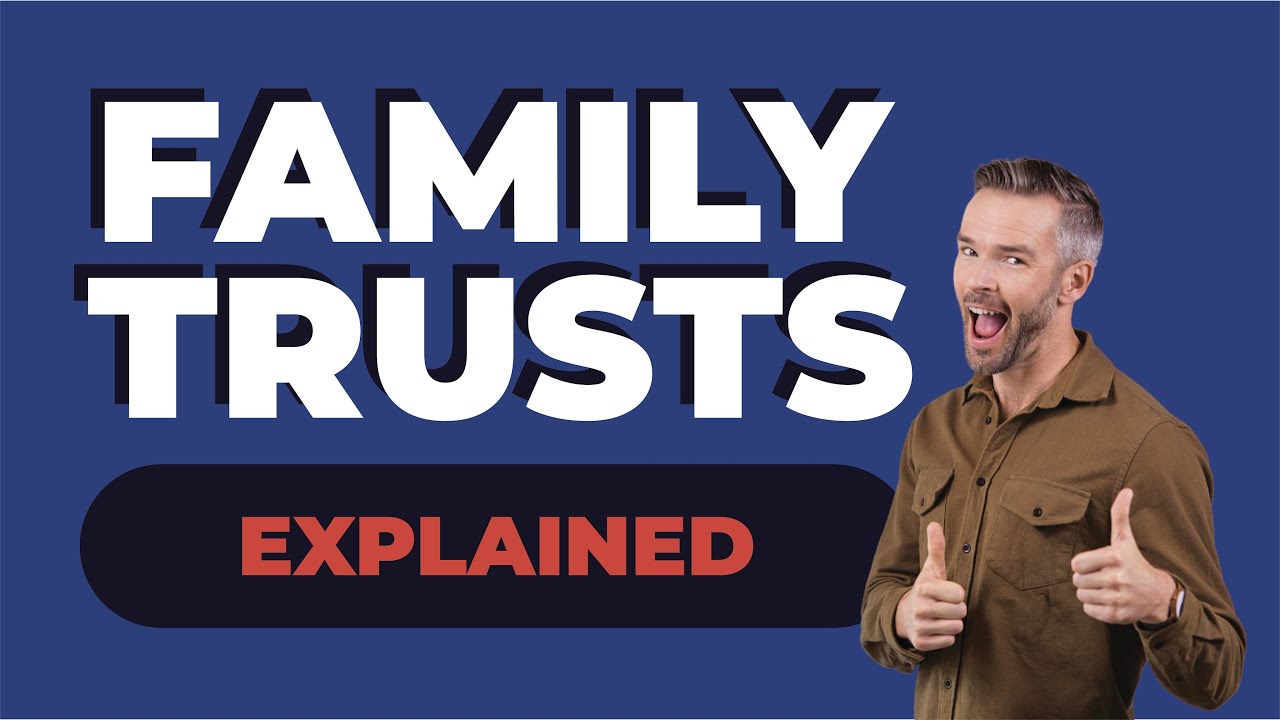Unraveling the Family Trust: Its Meaning and Importance
Alright, folks, lean in! Let’s talk turkey about the family trust’s nitty-gritty. So, what is a family trust? To put it in simple terms, a family trust is a basket where you place your assets—think properties, investments, and the family silver—to benefit your family members, blood or bond. Yes, it does sound pretty straightforward, right?
Yet there’s more than what meets the eye. With a family trust, you can dictate the who, how, and when of this wealth transfer which typically occurs after you’ve soared to those pearly gates. And it’s not just about inheritance, my friends. A family trust ensures your loved ones aren’t left whooping in the wind if disaster strikes—think bankruptcy or lawsuit. Plus it provides for seamless, hasty wealth transfer, thankfully avoiding those pesky probates. Benefit-touting? You bet!
We’re not stopping at private gains though. Family trusts play a pivotal role in the broader economy as well. Over at Iot software, they’ve observed how family trusts, providing financial stability, encourage investment and entrepreneurial risk-taking. That’s job creation and economic growth right there, folks!

The Evolution of Family Trusts: Historical Perspective
Now, you might be thinking, “Wow, these family trusts sure pack a punch, where did they come from?” Glad you asked! They trace their roots to the English common law system. Initially, they protected the properties of knights leaving for the crusades. Over the years though, their rocket power belted off into versatile tools of wealth management and planning.
Nowadays, in 2024, family trusts still stand tall in the financial landscape. Yet their import isn’t solely medieval mail-clad knights. They’ve adapted to our modern demands, offering financial protection and strategic tax management without breaking a sweat—or laws.

| Subject | Description |
|---|---|
| What is a Family Trust | A legal framework designed to hold and manage assets on behalf of beneficiaries, often family members of the person who establishes the trust (grantor). It is a common tool used in estate planning. |
| Types of Family Trust | Family Trust can be either revocable (can be altered or cancelled by the grantor during their lifetime) or irrevocable (cannot be modified or terminated without the permission of the beneficiary). |
| Beneficiaries of a Family Trust | Usually include children, grandchildren, siblings, a spouse or any other family member as chosen by the grantor. However, friends, charities or non-family members can also be beneficiaries. |
| Comparison with a Will | Unlike a will, which only dictates the distribution of assets upon death, a trust can be designed to distribute assets at any determined time, and is managed by a third party (Trustee). |
| Costs and Obligations | There may be ongoing fees for the Trustee who is responsible for managing the estate. There may be legal costs to defend the Trust if required, and annual tax filings might be necessary leading to tax preparation and filing costs. |
| Advantages | Beneficial for estate planning, it can help ensure preserving wealth and providing for beneficiaries. It also offers potential tax advantages and privacy as trust agreements are not public record. |
| Drawbacks | Potential legal costs, tax preparation and filing cost, and management fees for the Trustee. Also, once created (particularly in the case of an irrevocable Trust), they might not be easy or sometimes possible to modify or terminate. |
Delving Into the Family Trust Meaning: Legal and Economic Perspectives
From the legal side, a family trust is a binding agreement. The grantor—that’s you— transfers assets to the trust. The trustee—akin to an estate manager—then oversees these assets for the beneficiaries—the lucky ducks getting ahead in life. This legal agreement may sound daunting, but don’t sweat it! Family trusts are as flexible as your yoga instructor. They can be revocable or irrevocable; cat’s choice. In other words, you can change your mind with a revocable trust, but once you lock in assets with an irrevocable trust, it’s a done deal!
Switching gears to the economic side, family trusts are a game of equal definition—ensuring you spread your wealth to loved ones with precision and strategy. It’s all about preserving family wealth, minimizing tax liabilities, and protecting assets from creditors or distress definition conditions.
Okay, folks! Now that we’ve got those brain gears grinding let’s get to the family trust structure. We’re going backstage, bring the spotlight in!

Family Trust Blueprint: Structure and Key Components
So, we’ve got three primary roles in this trust play. Firstly, we’ve got the settlor, the shaker and mover who sets up the trust (spoiler alert: that could be you). Next, the trustee, the trusted custodian who manages the trust, a role not for the faint of heart. Lastly, the beneficiaries—yes, you guessed it—the fortunate souls who benefit from these trust assets.
These trust assets? They’re called the trust property, and they’re a mixed bag. We’re talking real estate, cash, stocks, businesses—the whole nine yards. The goal of the trust is to shield these assets—keep ’em safe and sound just like a stick built home.

Building a Family Trust: Process and Essential Steps
Hopping on the family trust bandwagon isn’t a stroll in the park. It requires careful mulling over and a good ol’ fashioned commitment. So, here goes the process:
Step 1: Identify the property you want to hold in trust; choose wisely, folks!
Step 2: Decide who gets what – set the terms for the beneficiary distributions.
Step 3: Designate a trustee; choose someone trustworthy, this ain’t no horseplay stuff!
Step 4: Create the family trust document; this is the biggie guys—a formal document where you jot down everything from steps one to three.
Be very sure you don’t tumble into any legal pitfalls. It’s not about being paranoid but instead about staying prudent.

Family Trust and Taxation: A Crucial Connection
Family trusts are economical little firecrackers when it comes to tax planning. By transferring assets into a trust, the grantor can curtail their taxable estate, leading to smaller inheritance taxes when they pass. So basically, trusts are the taxman’s kryptonite.
But, wait a sec. Before you start seeing dollar signs, it’s worth noting that the tax benefits are in many ways equal to individual ownership. It’s not about one being another word For poor—they simply serve different purposes.

Demystifying the Myths Around Family Trusts
Now listen up—a myth-truth face-off is in order.
Myth: Trusts are a ploy for the filthy rich.
Truth: No, sir! Trusts are not prioritizing the so-called ‘one-percents.’ They cater to regular Joes and Janes, providing value irrespective of wealth status.
Myth: Trusts are too expensive and complicated to set up.
Truth: Wrong again! Trusts aren’t trickier than learning Como Hacer Una Carta. You might need legal assistance, though. DIY is commendable, but sometimes it’s smarter to call in the pros.
What is a Family Trust to Your Potential Beneficiaries?
From the beneficiary’s viewpoint, things are mostly hunky-dory. They receive assets or income from the trust as decided by you, the settlor. That might involve periodically getting interest from investments or living in a house held by the trust-free of charge. Yet, as you know, all that glitters is not gold. Beneficiaries might face limitations based on the trust conditions. The keyword here is transparency. It keeps everyone on the same page—no surprises, no hard feelings!
Making Changes to a Family Trust: Revision and Dissolution
Contrary to the popular phrase, change is not only constant but is also possible in a family trust. With a revocable family trust, you can amend it to your heart’s content as long as you’re alive and kicking. Got more assets, a new family member, or a falling out? Adjust the trust accordingly. Just bear in mind: once you’re gone, that trust becomes ironclad. As for dissolving the trust, it isn’t a stroll in the park. It could trigger legal implications and tax consequences.
Family Trusts: Looking Beyond Wealth Protection
Reeling back into our discussion, family trusts aren’t only defensive tools—far from it. They’re also wonderful for gifting, offering an efficient way to make substantial financial gifts without triggering gift taxes. Plus, they’re perfect for charities—if you’re into leaving a legacy, setting up a charitable trust could satisfy both altruistic and financial goals.
The Bold Leap: Is a Family Trust Right for You?
So, is a family trust your cup of tea? Well, it depends on your financial goals, assets, and family situation. If you’ve got a sizeable estate, a blended family, or complicated distribution wishes, a family trust could be up your alley. It’s not a one-size-fits-all, take it or leave it situation. Take your time, fan those flames of consideration—after all, your definition of What Does commitment mean could hint at whether you’re ready for a trust.
Decoding the Paradox: Unpacking the Family Trust Narrative
It’s time to wind down, folks. Family trusts—the wise old owls of wealth management tools—are versatile, strategic, and robust. They offer protection, plan your estate, minimize tax, and ensure an efficient, elegant transfer of your wealth. Yet, like every concept worth its salt, it comes with layers of complexities and nuances. The key? Understand what a family trust truly implies, consider your options, and take the leap—or not! It’s your rodeo, after all!
What is the main purpose of a family trust?
A family trust, eh? It’s main purpose is to protect and manage family assets. It’s a little like a financial safety net. You’re putting your assets under the care of a trustee who will, in turn, ensure a steady income for loved ones even after you’re gone.
What is the downside of a family trust?
Now, nothing’s perfect, and family trusts have their downside, too. They can be expensive to set up and maintain, not forgetting the associated tax implications. You’re also giving up some control of your assets, which can feel a bit like letting go of the wheel.
What is the difference between a family trust and a regular trust?
Comparing a family trust to a regular trust is like comparing apples to oranges. While both manage assets, a family trust specifically benefits your family members, while a regular trust can include non-family beneficiaries.
What is the difference between a will and a family trust?
The difference between a will and a family trust is clear as night and day. A will spells out what happens to your assets after you’re gone, while a trust takes effect immediately and can continue to work its magic after you’ve passed away.
Is there a downside to having a trust?
And yeah, there can be a downside to having a trust. Costs, complexity and losing control over your assets can be a bit of a kick in the teeth if you’re not prepared.
What assets should not be in a trust?
Assets like retirement accounts or those with designated beneficiaries shouldn’t be tucked into a trust, as they can result in avoidable tax implications.
What is a trust and why are they bad?
Trusts have a bad reputation largely due to the cost, complexity and the loss of control over assets. It’s a bit like getting a fancy sports car but not being able to drive it.
Why do rich people put their homes in a trust?
Why do rich folks put their homes in a trust? It’s all about protecting assets, managing estate taxes, maintaining privacy and avoiding probate.
What type of trust is best for a family?
When it comes to choosing a trust for families, revocable living trusts win the race. They offer flexibility and control while you’re alive, and smooth the transfer of assets when you’re not.
Is a trust better than inheritance?
Trusts versus inheritance is a heavyweight bout. A trust can be better as it offers control and protects assets, while inheritance can be a straightforward but loaded luck of the draw.
Why use a trust instead of a beneficiary?
Trusts are often chosen over beneficiaries since they provide a level of control and asset protection that naming simply a beneficiary does not.
Should your parents have a trust?
As for your parents, if they have substantial assets or complex affairs, they should definitely consider having a trust.
What type of trust is best?
The best trust type is really down to personal circumstances, but revocable living trusts tend to be popular for their flexibility.
What are the benefits of a family trust?
Family trusts are the gifts that keep on giving. They protect assets, manage money for under-aged or financially inexperienced beneficiaries, and even sidestep probate.
At what net worth should you consider a trust?
As for when you should consider a trust, experts suggest a net worth of at least $100,000 in assets or if you own real estate.
What type of trust is best for a family?
As for the best trust for families, I’ll repeat myself: a revocable living trust takes the cake.
What are the pros and cons of having a trust?
The pros of having a trust include avoiding probate, maintaining privacy and providing asset protection. However, the cons include setup costs, operating expenses and less direct control over your assets.
At what net worth should you consider a trust?
Lastly, if your net worth tips the scales at $100,000 or more, or if you own property, considering a trust would be a smart move.


